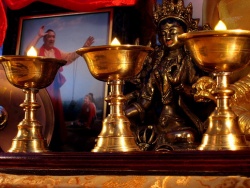Hundreds of light offerings
Throughout Buddhist history, many great masters have commented on the tremendous benefit of making offerings to the sangha as a way of increasing the benefit of prayers and Dharma activities In Tibet,
it was often said that wealthy people would support the Triple Gem by offering horses and yaks, while poorer people would offer thread and needles.
Regardless of the size of the offering, all people supporting the Three Jewels out of love and compassion are benefited by generating these precious qualities, by receiving prayers and blessings of the sangha,
and in turn, the activities of the Triple Gem are increasingly uplifted and strengthened by the generosity of practitioners and their contributions.
During the time of the Buddha in Shravasti, there was a beggar woman who had nothing to offer to the Buddha.
Great patrons of the Buddha like Antha Pindika and King Prasangika, gave so many offerings to the Buddha and his sangha which she appreciated so much, but she was unable to make such vast offerings herself.
One day she decided to make a single light offering in the temple where the Buddha and his disciples gathered to meditate. She went door-to-door begging for enough oil to make a single butterlamp offering.
Finally, after gathering enough oil, she offered a single lamp in the temple among hundreds of others lamp offerings.
Simultaneously, she made the heartfelt aspiration, "By this light offering may I achieve the same wisdom as Buddha Shakyamuni, the arhats and all enlightened beings, completely dispelling the darkness of ignorance of all sentient beings." Then she left the temple.
Throughout that day, the hundreds of light offerings gradually burned out. Among all of them, hers was the only lamp still glowing towards the end of the night.
That evening Ananda came to the temple. Seeing that a single light was still illuminated, he thought to extinguish the lamp by waving his hand but he was unable to put it out.
So he tried to blow it out with his breath and then by fanning his robes. Still he was unable to put out the flame.
At this time the Buddha entered the temple. He said, "Ananda, don't try to put out this lamp offering. You will not be able to do this.
An old beggar woman dedicated this lamp for the enlightenment of all living beings, so her aspiration cannot be interrupted. Please let it burn.
Leave it alone."
Upon hearing this Ananda was very surprised and he left.
The candle remained burning for days.
Even now in the Nyingma tradition of Tibetan Buddhism, we pray:
"Just as the beggar woman Nyenga
Offered a butterlamp to the Buddha,
Similarly, I offer this light to the Buddhas.
May I fulfill the same wishes."
As told by Khenpo Tsewang Rinpoche.
In a past life of the Great Dharma Patron, King Ashoka, he was just a small boy playing in the sand with other children.
Pretending to be a king with the other children as his ministers, they built a sand castle which included a treasury. At this time, Buddha Shakyamuni passed the children playing in the sand on his alms round.
Upon seeing the Buddha, the small child was very inspired. Immediately he bent over the sand castle and picked up the imaginary treasury room of the castle in his hands.
He quickly walked over to the Buddha to place these imaginary riches within his begging bowl.
At first Ananda moved to stop the boy, thinking with a loving heart that this sand would ruin the food within the Buddha's begging bowl. Yet the Buddha stopped Ananda from preventing this offering.
The Buddha was so tall, so one of this disciples bent down in front of him and requested the small boy to stand on top of his back. Doing so, the boy joyfully placed the imaginary treasury within the Buddha's begging bowl.
Following this event, Ananda asked the Buddha why he had allowed the boy to put sand in his begging bowl.
Smiling, the Buddha said that two hundred years after his mahaparinirvana a universal king (Skt. Chakravartin) would arise in India, and that he would perform extensive activities in support of establishing and spreading the Buddhadharma throughout the region.
The Buddha said that his name would be King Ashoka, and that this very boy would become that king due to the incredibly vast merits he developed by offering the Buddha a handful of sand with a genuinely loving heart.
As told by Khenchen Palden Sherab Rinpoche


